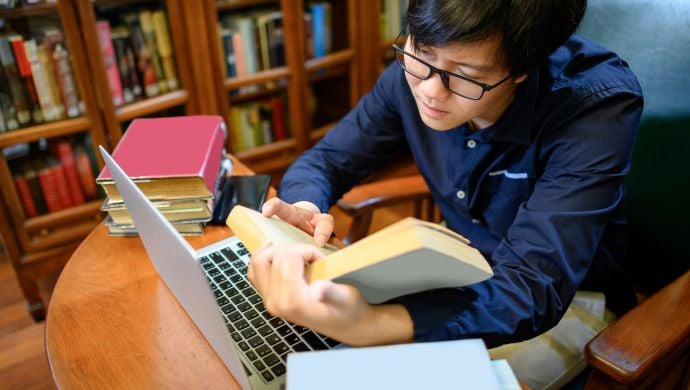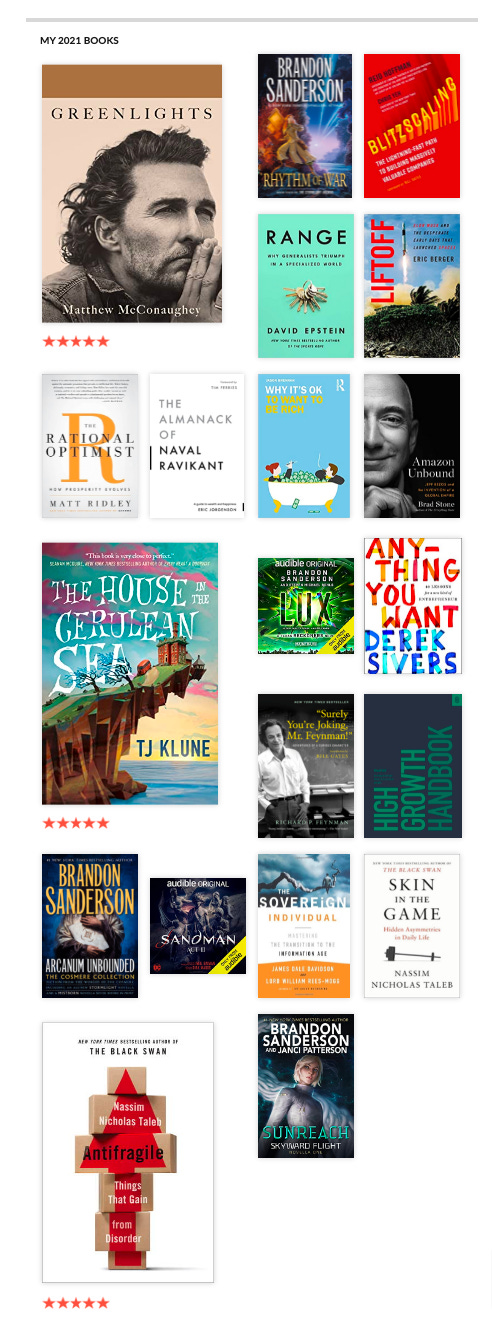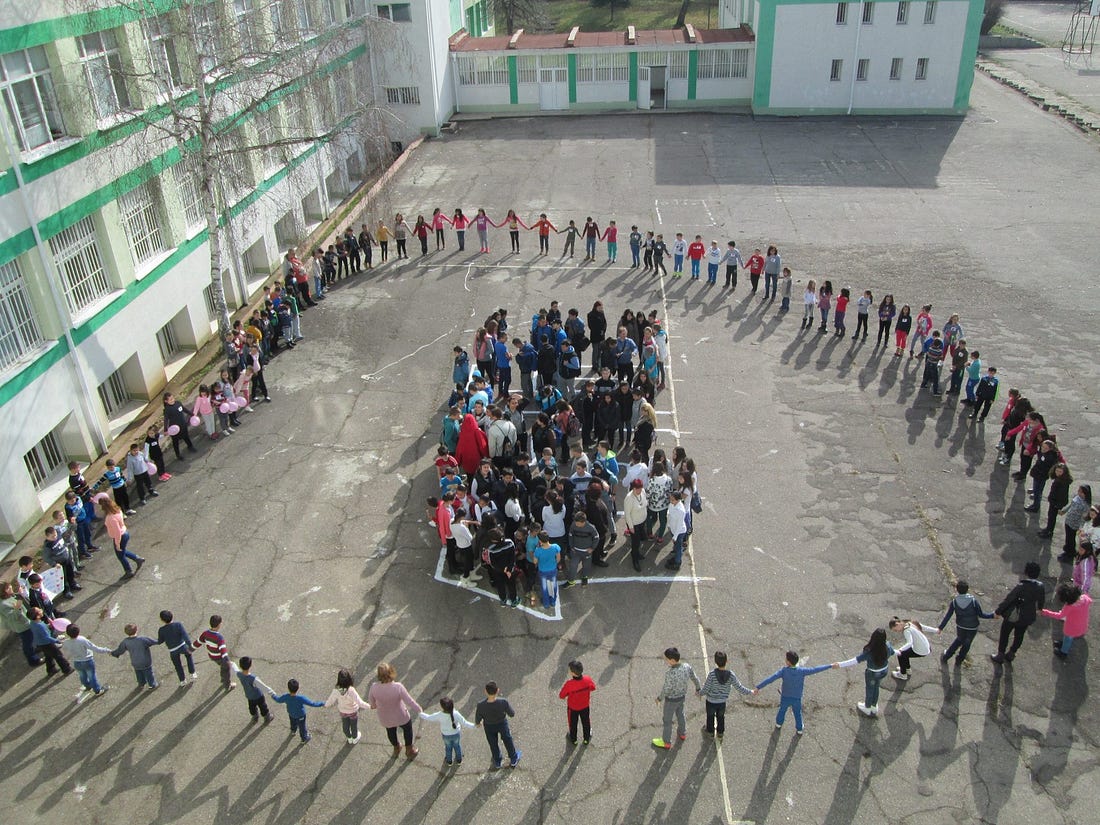
I developed the habit of reading books at an early age. While both my mom and dad read occasionally, they were not avid readers by any standard. Yet, somehow I found myself spending more time reading than exercising any other hobby of mine.
As a kid, I attended a humble elementary school located on the outskirts of Sofia. The school offered a tiny library. In fact, it did not look much like a library, just a room that used to store old furniture, converted into book storage. Yet, despite the poor appearance, I loved spending time there.
The librarian had one notebook to keep track of all visitors. Each student was assigned one page to keep a record of their activity. Most students would read just a few books in the course of their studies, so a page per person was plenty. At that age, pretty much everyone preferred to do sports or act cool rather than read. As far as I remember, I was the only student during my time who needed more than a page to keep track of all the books I borrowed. This leads me to think that my passion for reading must have developed quite early. I was obsessed with reading fantasy and science fiction. Books such as I, Robot (Isaac Asimov), Harry Potter series (J. K. Rowling), and The Wheel of Time (Robert Jordan) left lasting impressions. Overall, two things pulled me towards fantasy and science fiction. One, it helped me escape the day-to-day reality that at times was not pleasant. Two, such books broadened my perspective. It pushed the limits of what I thought was possible.
Also Read: Why Khailee Ng puts mental healthcare support as key to successful founders-investors relationship
As I got older, my book diet became more balanced. I started adding a lot more non-fiction. While fantasy and science fiction held sentimental value for me, learning about the real world felt important too. Over time, my reading started guiding important decisions in my life. The authors of those books felt like mentors I had never met.
“The reading of all good books is like a conversation with the finest men of past centuries.” – Rene Descartes
Eleven years ago, my consistent reading led to leaving my home country for studies abroad. Going to uni was not a typical choice in my circle of friends. Most of my high school classmates preferred to get regular jobs or just have fun. Given my circumstances, moving countries for studies was unthinkable. My parents could not support me financially, and I did not have a lot of savings myself. Yet, it always felt right. While it was not easy, I somehow managed to make it work. Thinking back, I give credit for that choice to the literature I read. Where else would I get that idea from?
Studying abroad was not the only contrarian choice that worked out for me. Reflecting on my career, I started working early, with my first job taking place when I was 14 years old. Becoming independent at such an age allowed me to build a pretty decent career in hospitality, even before completing my bachelor’s degree. Then, at the age of 22, I received an offer to lead an F&B outlet, part of a five-star resort. That was more than what anyone in my family had achieved (career-wise) so far. But I decided to turn down the offer, continue studying and pivot my career to tech. As a result, leaving all hospitality-related experience and knowledge behind.
“A classic problem in computer science is hill climbing. Imagine you are dropped at a random spot on a hilly terrain, where you can only see a few feet in each direction (assume it’s foggy or something). The goal is to get to the highest hill.
Consider the simplest algorithm. At any given moment, take a step in the direction that takes you higher. The risk with this method is if you happen to start near the lower hill, you’ll end up at the top of that lower hill, not the top of the tallest hill.” – Chris Dixon, Partner at a16z
In hindsight, that was one of the best decisions I ever took. I was clearly climbing what seemed to be the proper mountain but ultimately ended up being the lower hill. Looking back, it’s easy to make such conclusions, but at the time, I did not know anyone in tech. I did not have a single conversation with friends or family that encouraged me to make the leap. Nevertheless, I made the leap despite what my friends and family thought. Once again, my inspiration must have come from somewhere. I think reading the right books helped.
Also Read: SEA tech founders playbook: A to Z of becoming a fundraising legend (Part 1)
As I slowly explored the tech sector and started learning what I am good at, I took another unconventional choice. In 2016, I moved to Asia.
Everyone around me was, WTF? Why would you leave family, friends, and in general your comfort? After all, moving from Bulgaria to Denmark 11 years ago was hard enough. Later, changing industries added another layer of complexity. Yet, here I go again, moving 15,000 km away from family and friends to start from the bottom.
Five years later, I look back and think how that choice proved to be another great one. Relocating to an ecosystem experiencing high growth while facing talent shortage is a recipe for a rocketship career trajectory. Asia has the exact same dynamic. Massive market, plenty of capital, and lack of people who understand startups. Words cannot describe the importance of being in a good ecosystem. Especially when you are ambitious and have a lot of energy. Lately, I did the math and figured that my salary in the past five years experienced 420 per cent growth! Add all the learnings from operating several startups in emerging markets. Now, you can see why I stand behind that call five years later.
Looking back, I did not have many friends who left Europe for Asia. Under normal circumstances, most people would have a family member or friend who took on a similar path to guide them. But, unfortunately, I cannot think of anyone in my case.
Meaning, I never had a mentor or a family member who encouraged me to make such risky choices. But I must have received the inspiration from somewhere. The more I reflect on it, the more I think my love for reading must be responsible.
Having said that, I did meet some great people who inspired me as I was making those choices. You always do. Yet, I still feel that my reading diet guided me a lot better than any person I met. As a result, I do my best to nurture my love for books daily. For example, annually, I set resolutions on how much I want to read. I write essays like this one to encourage self-reflection. And I do my best to have a balanced diet of fiction and non-fiction books. As Naval once said, it’s important to read whatever interests you early on to build the habit. Once the habit is formed, you can read anything.
“Read what you love until you love to read.” – Naval
Additionally, I am very picky about the books I read. Over time, I built a process of making decisions on the next book I will be reading. The process is simple and consists of triangulation between the following methods:
- Recommendations from people I respect
- Ratings on GoodReads or Amazon
- Qualitative reviews
While the method sounds simple, I end up picking worthy books in 9 out of 10 cases. It works because I religiously follow each step to ensure the book is good enough. Anyway, enough about me. In 2021, I read many great books, but these were some of my favourites.
Also Read: SEA tech founders playbook: A to Z of becoming a fundraising legend (Part 2)
Three books I loved reading in 2021
This year, my reading list includes two sci-fi, four fantasy, three biographies, and everything else can be parked under self-improvement.

“Surely You’re Joking, Mr. Feynman!”: Adventures of a Curious Character by Richard P. Feynman | source
“You have no responsibility to live up to what other people think you ought to accomplish. I have no responsibility to be like they expect me to be. It’s their mistake, not my failing.” ― Richard Feynman, Surely You’re Joking, Mr. Feynman!
At first glance, the book is written in a very casual and fun way, which makes it easy to read. I devoured it over a week. But do not be fooled by the playful character of Richard Feynman. He is a winner of the Noble Prize in Physics (1965), holds the Einstein Award (1954), Ernest Orlando Lawrence Award in Nuclear Physics (1962), and has been awarded the Oersted Medal (1972). On top of that, he taught himself how to open uncrackable safes. He learned how to draw portraits of people and even performed his own exhibition. All that while joining a Brazilian Bongo group. Additionally, he traveled around North America, Brazil, and Japan. Not to mention the entertaining stories from casinos and strip bars.
I can usually tell when I will love a book: I cannot shut up about it. Richard Feynman’s biography is definitely one of those books. He is a personal hero of mine. A genuinely funny character who nurtured his curiosity and became one of the best at various disciplines. Disciplines entirely unrelated to each other (e.g., playing in a bongo group and cracking safes). He understood the importance of following your curiosity by immersing in a new field. Not only to give it a try but to become one of the world’s best experts at each hobby of his. His intelligence, positive attitude, and great sense of humour result in an incredible read.
Also Read: Startup funding rounds: A handbook from seed to exit
Greenlights by Matthew McConaughey | source
“We all step in shit from time to time. We hit roadblocks, we fuck up, we get fucked, we get sick, we don’t get what we want, we cross thousands of “could have done better”s and “wish that wouldn’t have happened”s in life. Stepping in shit is inevitable, so let’s either see it as good luck, or figure out how to do it less often.” ― Matthew McConaughey, Greenlights
Yes, another memoir. Perhaps, the gloomy mood around COVID-19 made me appreciate books and people who are overwhelmingly positive and funny. It’s a suitable read for all times, but somehow it does make more sense during these uncertain and strange times. I listened to the audiobook while travelling across Bali, Indonesia, and loved every minute of it. Before reading Matthew’s memoir, I did not know much about him. Of course, I did watch many of his movies but did not know anything about his actual character. In turn, the experience felt like I was sitting with him over a beer while listening to stories of his life. He is witty, poetic, funny, and unpredictable. I laughed out many times or stopped to reflect on a profound truth that resonated with me.
I strongly recommend you to get the audiobook. His voice is great, and the narration is fun and poetic. I was frequently smiling while listening. But consider that the book can feel a tad narcissistic at times; after all, it’s a memoir. Perhaps not everyone’s cup of tea, but I loved it.
Antifragile: Things That Gain from Disorder by Nassim Nicholas Taleb | source
“Further, my characterisation of a loser is someone who, after making a mistake, doesn’t introspect, doesn’t exploit it, feels embarrassed and defensive rather than enriched with a new piece of information, and tries to explain why he made the mistake rather than moving on. These types often consider themselves the ‘victims’ of some large plot, a bad boss, or bad weather. Finally, a thought. He who has never sinned is less reliable than he who has only sinned once. And someone who has made plenty of errors—though never the same error more than once—is more reliable than someone who has never made any.” ― Nassim Nicholas Taleb, Antifragile: Things that Gain from Disorder
When I read my first book by Nassim Taleb, “Skin in the Game,” I was shocked by his attitude. It’s so rare to find an author who does not try to be politically correct at all times. Taleb is brutally honest and does not sugarcoat his opinions. In turn, his attitude triggers many people to dislike him. He seems to be angry, contrarian, and dismissive all the time. Yet, you will learn a ton by giving him a chance and pushing through his harshness. He is intelligent, observant, and knows how to break down complex concepts in a way so anyone can understand.
The whole book’s premises can be broken down to the following quote: “Difficulty is what wakes up the genius.” Antifragility is a fascinating concept. Many people think of resilience or robustness as the definition of antifragile. But it’s a lot more. Resilience and robustness resist shocks and remain the same. Antifragile people use shocks, chaos, disorder, volatility, and uncertainty to get stronger.
Also Read: Startup funding rounds: A handbook from seed to exit
In my humble opinion, to be successful in today’s ever-changing world, you have to become antifragile. I find myself pitching the book to friends and family during dinner conversations. A clear sign that it left a lasting impact on me. This is one of the most important books I have ever read, and I hope you will appreciate it as much as I did.
Reading List 2022
My reading list for the next year is not completed yet, and that’s intentional. While I have a few books on my shelf, I leave a lot of room for serendipity as my interests evolve. At the moment, I have purchased the following books and cannot wait to start them:
- “The Cold Start Problem” by Andrew Chen – as a founder and operator in tech, the content of Andrew Chen has been very influential for me over the years. Moreover, I leveraged his research when writing on network effects and marketplaces. In turn, I cannot wait to read his newest book. After all, the author could be considered as one of the top experts in network effects globally.
- “Project Hail Mary” by Andy Weir – Bill Gates recommended Project Hail Mary earlier this week, which piqued my interest. Looking at the great reviews and since I am a big fan of The Martian, I bought the book quickly.
- “Will” by Will Smith and Mark Manson – since I loved Matthew McConaughey’s memoir and am a fan of Will Smith (both music and acting), it felt appropriate. So I am super excited about reading this one.

—
Editor’s note: e27 aims to foster thought leadership by publishing contributions from the community. This season we are seeking op-eds, analysis and articles on Web3, climate tech and sustainability. Share your opinion and earn a byline by submitting a post.
Join our e27 Telegram group, FB community or like the e27 Facebook page
Image Credit: zephyr18
The post Three books I loved reading in 2021 and the lessons they provided appeared first on e27.


